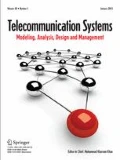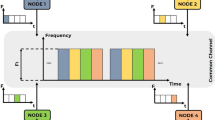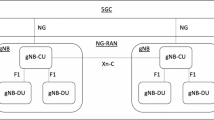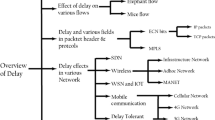Abstract
IEEE 802.16 wireless MAN standard specifies the air interface of broadband wireless access systems providing multiple services. In the wireless MAN, the best effort service class is ranked on the lowest position in priority and is assisted by a MAC scheme based on reservation ALOHA. In such a MAC scheme, a collision of resource requests is unavoidable so that the wireless MAN standard adopted a truncated binary exponential back-off scheme to arbitrate request attempts. While an exponential back-off scheme is simple to implement, its capture or starvation effect was revealed to deteriorate the fairness in short-term throughput and delay variance in the long term. Aiming at improving the throughput and delay performance, we thus propose the unisource and multisource m-ary tree schemes as alternatives for resolving request collisions in a wireless MAN. For the unisource tree scheme, we first develop an analytical method to exactly calculate the throughput in the saturated environment. Using the analytical method and simulation method as well, we then evaluate the saturated throughput, mean of MAC PDU delay and variance of MAC PDU delay in each proposed scheme. From the numerical examples, we confirm that the unisource and multisource m-ary tree schemes invoke superior throughput and delay performance to a truncated binary exponential back-off scheme.
Similar content being viewed by others
References
J. Capetanakis, Tree Algorithm for Packet Broadcast Channels, IEEE Transactions on Information Theory 25(5) (1979) 505–515.
K. Christensen, Performance evaluation of the binary logarithmic arbitration method (BLAM), in: Proceedings of IEEE Conference on Local Computer Networks (1996) pp. 396–402.
M. Corner, N. Golmie, J. Liebeherr and D. Su, A priority scheme for the IEEE 802.14 MAC protocol for hybrid fiber-coax networks, IEEE/ACM Transactions on Networking 8(2) (2000) 200–211.
C. Eklund, R. Marks, K. Standwood and S. Wang, IEEE Standard 802.16: A Technical overview of the Wireless MAN Air Interface for Broadband Wireless Access, IEEE Communications Magazine 40(6) (2002) 98–107.
W. Feller, An Introduction to Probability Theory and Its Applications. John Wiley & Sons (1968).
J. Hayes, An Adaptive Technique for Local Distribution, IEEE Transactions on Communications 26(8) (1978) 1178–1186.
IEEE 802.16. IEEE Standard for Local and Metropolitan Area Networks-Part 16: Air Interface for Fixed Broadband Wireless Access Systems, April (2002).
IEEE 802.16. IEEE Standard for Local and metropolitan area networks-Part 16: Air Interface for Fixed Broadband Wireless Access Systems, October (2004).
N. Mehravari and T. Berger, Poisson multiple-access contention with binary feedback, IEEE Transactions on Information Theory 30(5) (1984) 745–751.
J. Park, W. Shin, J. Ha and C. Choi, Maximal Grant for Resource Request Supporting Best Effort Service in Wireless MAN, in: Proceedings of International Conference on Networking (2004) pp. 356–362.
K. Ramakrishnan and H. Yang, The Ethernet Capture Effect: Analysis and solution, in: Proceedings of IEEE Conference of Local Computer Networks (1994) pp. 228–240.
R. Rom and M. Sidi, Multiple Access Protocols Performance and Analysis. Springer-Verlag (1990).
D. Sala and J. Limb, Comparison of Contention Resolution Algorithms for a Cable Modem MAC protocol, in: Proceedings of IEEE INFOCOM(1998) pp. 83–90.
B. Tsybakov and V. Mikhailov, Free synchronous packet access in a broadcast channel with feedback, Problems in Information Transmission 14(4) (1978) 259–280.
D. Twu and K. Chen, Design and analysis of the multiple access protocols over the CATV/HFC networks, in: Proceedings of IEEE ICC (1998) pp. 854–858.
B. Whetten, S. Steinberg and D. Ferrari, The Packet starvation effect in CSMA/CD LANs and a solution, in: Proceedings of IEEE Conference of Local Computer Networks (1994) pp. 206–217.
Author information
Authors and Affiliations
Corresponding author
Rights and permissions
About this article
Cite this article
Park, J.K., Shin, W.C., Ha, J. et al. Unisource and Multisource Tree Schemes for Collision Resolution in Wireless MAN. Telecommun Syst 30, 215–235 (2005). https://doi.org/10.1007/s11235-005-4326-z
Issue Date:
DOI: https://doi.org/10.1007/s11235-005-4326-z




